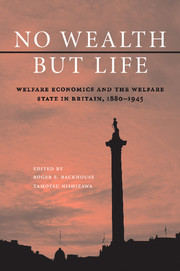Book contents
- Frontmatter
- Contents
- Contributors
- Preface
- 1 Introduction: Towards a Reinterpretation of the History of Welfare Economics
- I CAMBRIDGE WELFARE ECONOMICS AND THE WELFARE STATE
- II OXFORD ETHICS AND THE PROBLEM OF WELFARE
- III WELFARE ECONOMICS IN THE POLICY ARENA
- 8 ‘The Great Educator of Unlikely People’: H. G. Wells and the Origins of the Welfare State
- 9 Whose Welfare State? Beveridge versus Keynes
- 10 Beveridge on a Welfare Society: An Integration of His Trilogy
- IV POSTSCRIPT
- Index
- References
8 - ‘The Great Educator of Unlikely People’: H. G. Wells and the Origins of the Welfare State
Published online by Cambridge University Press: 06 July 2010
- Frontmatter
- Contents
- Contributors
- Preface
- 1 Introduction: Towards a Reinterpretation of the History of Welfare Economics
- I CAMBRIDGE WELFARE ECONOMICS AND THE WELFARE STATE
- II OXFORD ETHICS AND THE PROBLEM OF WELFARE
- III WELFARE ECONOMICS IN THE POLICY ARENA
- 8 ‘The Great Educator of Unlikely People’: H. G. Wells and the Origins of the Welfare State
- 9 Whose Welfare State? Beveridge versus Keynes
- 10 Beveridge on a Welfare Society: An Integration of His Trilogy
- IV POSTSCRIPT
- Index
- References
Summary
H. G. Wells's novel The New Machiavelli (1911) contains some notable criticisms of the Edwardian Liberal party. The hero, Richard Remington, is elected as Liberal MP in 1906, but becomes disillusioned with the party and with ‘our self-satisfied new Liberalism and Progressivism’. Of the Liberals themselves he says mockingly: ‘It was tremendously clear what they were against. The trouble was to find out what on earth they were for’! (Wells 1911, II, pp. 31, 20). Commended as ‘the equal of any political novel in the English language’ (Clarke 1996, p. 40), it has also been described as ‘an anti-Liberal tract’ (Cowling 1985, p. 216). That interpretation might seem to be a natural one, given that, in his extensive nonfiction political writings, Wells is generally thought to have presented ‘a fundamentally socialist doctrine of reform’ (Hyde 1956, p. 217). Believing that ‘the creation of Utopias – and their exhaustive criticism – is the proper and distinctive method of sociology’, he put much effort into describing the ideal society (Wells 1916). His earliest and best-known attempt at this was A Modern Utopia (1905a), which described an idyllic World State ruled over by ‘voluntary noblemen’ known as ‘Samurai’. Therefore, much as Wells has been hailed for his penetrating satirical comments on the Edwardian social-sexual-political milieu, it might seem that he was, mentally speaking, almost on a different planet from the practical-minded men who designed the pre-1914 welfare reforms. Yet Wells undoubtedly had a significant impact on key New Liberal reformers.
- Type
- Chapter
- Information
- No Wealth but LifeWelfare Economics and the Welfare State in Britain, 1880–1945, pp. 161 - 188Publisher: Cambridge University PressPrint publication year: 2010
References
- 4
- Cited by

